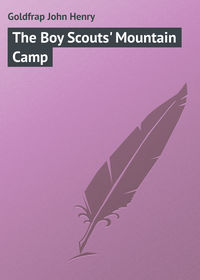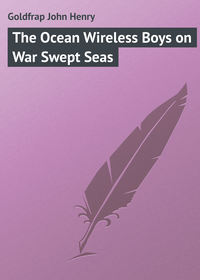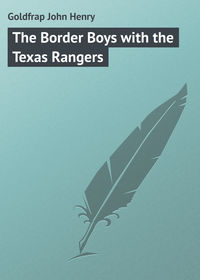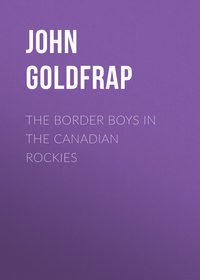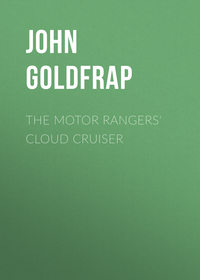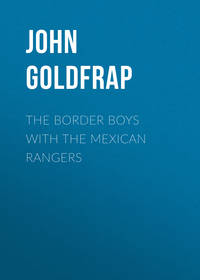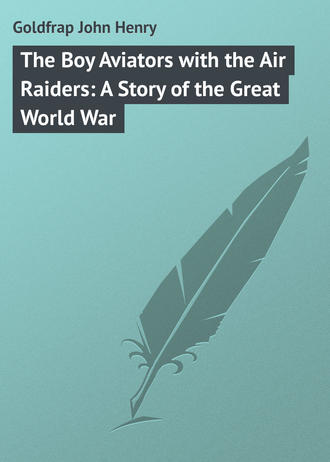 полная версия
полная версияThe Boy Aviators with the Air Raiders: A Story of the Great World War
Apparently Frank was enough interested to cross over so as to see for himself what was wrong. He sat down on the box Billy vacated and tried to get in touch with the operator at the central switchboard. After testing it in several ways, Frank replaced the receiver and looked up at his chum.
“Have they disconnected our wire at Central, do you think, Frank; or is the hello girl flirting with her beau, and not paying attention to business?” asked Billy.
“Neither,” answered the other soberly; “but I’m afraid somebody has cut our wire so as to keep us from calling for help if anything happens here to-night!”
CHAPTER III.
SAVING THE GREAT SEAPLANE
“Gee whillikins! that sounds like a serious proposition, Frank!” exclaimed Billy Barnes, when he heard the opinion of his companion.
“It looks as though we’re up against something,” admitted the other grimly. “They’ve evidently set out to capture this seaplane, and mean to do it, no matter at what cost.”
“A compliment from the Kaiser to the ingenuity of Yankee inventors, I’d call it,” said Billy; “but all the same I don’t feel like throwing up my hands and letting them raid our shop here. It’s a good thing we made that discovery, thanks to Pudge and his sharp eyes.”
“Yes, and that you thought to use the wire, which showed us how somebody had been meddling so as to cut us off from the city,” Frank remarked.
“What if they come in force, knowing we’re here, Frank?”
“That door would not be able to stand much of an attack if they carried axes along with them, I’m afraid,” Billy was told.
“My stars! do you think they’d be apt to do that sort of thing?” demanded the astonished assistant, as he looked around for some sort of weapon with which he might defend the passage of the doorway, should it come to a question of fighting.
“If they want this plane as badly as we think they do,” said Frank, “there is little that desperate men might attempt that they would not try.”
“And still there’s no sign of poor Pudge!” ventured Billy, putting considerable emphasis on the adjective, as though he could almost imagine the happy-go-lucky Pudge lying on his back somewhere along the road, groaning in pain after having been struck down by a cowardly blow.
“I’m sorry to agree with you,” Frank admitted slowly, “but at the worst we’ll hope they’re only detaining our chum, and that he hasn’t been hurt.”
“How about my slipping out and trying to go for help, Frank? If they only knew at Headquarters about this, they would send a whole regiment of British Tommies on the run to patrol our works here. Say the word and I’m off.”
Frank, however, shook his head as though the idea did not appeal to him.
“The chances are they would be on the lookout for something like that, Billy.”
“And lay for me, you mean, don’t you, Frank? Well, then, if it wasn’t so cold I’d propose slipping down to the water and doing a little swimming stunt. Too bad we didn’t think to have a boat of some kind with us.”
“I was just thinking,” ventured Frank, “that only on account of our being rushed for time we would have installed a wireless plant here, as we’ve often done before. Then we could send all the messages we wanted, and these spies wouldn’t be able to bother with them.”
“Yes, if we had only thought we’d run against a snag like this, Frank, we could have done that as easy as falling off a log. But it’s too late now to bother. The question is, what can we do about it?”
“There’s always one last resort that I know of, Billy.”
“Glad to know it, but please inform me as to its nature, won’t you, Frank? I would give half of my year’s salary just to be able to snap my fingers in the faces of these smart secret agents of the envious Germans who want to steal our thunder.”
Frank turned and pointed straight at the big seaplane.
“There’s the answer, Billy!” he said shortly.
At first the other simply stared as though unable to grasp the meaning of Frank’s words. Then a sudden gleam of gathering intelligence began to show itself in his eyes; he emphatically brought down his fist in the open palm of his other hand.
“Wow! that’s sure the ticket, Frank!” he burst out with, his enthusiasm spreading until his face was one solid grin. “We’ve got a way of escape right in our grip, and I was so blind as not to see it. Run off in the plane, of course, and leave the smarties to bite their fingernails. Great head, Frank! These German spies may think themselves wide-awake, but they’ll have to get up bright and early in the morning to catch two Yankee boys napping, believe me!”
“Listen, Billy!”
“Did you think you heard something then, Frank?”
“There’s someone at the door yonder; I saw it move, but the bar kept it from giving way,” Frank went on in a low tone. “Don’t act as though you suspected anything out of the way. They may be watching us through some peep-holes that have been bored in the walls. It would be foolish for us to give our plan away.”
“I understand what you are aiming at, Frank,” remarked the other, trying hard to appear perfectly natural, immediately adding under his breath: “There, I saw the door quiver again. They must wonder why it refuses to give way. That bar is our salvation, because like as not there’s a number of them out there who would flock in with all sorts of weapons, meaning to keep us quiet while their aviators examine the machine and get ready for a launching. Whee! then good-by to our bully Sea Eagle forever.”
“That’ll never happen as long as we can lift a hand to prevent it,” said Frank.
“Say, you don’t think that could be Pudge trying the door?” suggested Billy, as though struck by a sudden bright idea.
“Not very likely,” came the reply; “but we can easily tell. If he hears me give our old signal, Pudge will answer on the dot. Listen and see if anything comes of it.”
The whistle Frank emitted was of a peculiar character. It was immediately imitated from without, and so exactly that one might think it an echo. Frank shook his head on hearing this.
“Pudge isn’t there,” he said decisively. “If he was, as you very well know, Billy, he would have sent back the other call, entirely different from the one I gave.”
“Then some fellow answered for Pudge, thinking we might open up, when they could rush the place and get possession – is that the way it stands, Frank?”
“As near as I can make out, it covers the ground,” the young air pilot replied. “Now I’m going to put out this light. We don’t really need it any longer, and if they are watching us through any peep-holes, it would give our plan away.”
“We ought to know every part of this coop, Frank. As for the machine itself, I warrant you could find any stay or guy while it’s pitch dark. Let it go. There, they are trying the door again. Seems as if they can’t understand why it doesn’t give way. If it keeps on shutting them out, sooner or later they’ll try to batter it down. Oh! if I only had a gun here.”
“I intended having one with the seaplane, but thought I wouldn’t bother until we meant to start on a trip,” explained Frank, keen regret in his voice.
“Seems to me it’s always the unexpected that keeps cropping up with us,” complained Billy. “I can look back to lots of times when things happened just as suddenly and without warning as this has.”
“But they didn’t down us, you want to remember,” advised the other, in that confident way of his that always made his chums feel so much better.
“Now they’re starting to pry at the doors, Frank, which means business. Hadn’t we better be getting ready to make a start?”
“First of all I want you to stand by, and when I give the word fling both the large doors wide open,” Frank told him. “After that, as I switch on the searchlight, so as to see what lies ahead, climb aboard to your regular place. And, Billy, please don’t have any hitch in the program if you can help it!”
“Depend on me, Frank,” said the other, slipping away in the darkness that now filled the interior of the big hangar.
Frank mounted to his seat. As no flight of consequence was intended, he did not bother donning the head shield he always carried with the machine, his gloves alone being deemed necessary for the occasion, though both of them had wisely secured their fleece-lined leather jackets. Just as Billy had said, Frank was so familiar with every lever and stay, as well as with the engine, that, with his eyes blindfolded, he could have manipulated the intricate working parts.
Quickly he adjusted things to his liking with a deftness that left nothing to be desired. The fact that those unseen parties on the other side of the door were becoming more insistent with every passing second did not seem to disturb Frank at all; for he knew very well they could not stop his departure now.
When, presently, he had finished his simple preparations and everything was ready for the grand finale, he gave the signal that Billy was expectantly awaiting.
“Open up, Billy!”
Immediately both wide doors flew back, for the boys had arranged things so that it required but a simple movement to accomplish this. Then Billy hustled toward the seaplane, which no longer stood there like a black shadow; for Frank had, with the pressure of his finger, caused the powerful searchlight placed in the bow of the remarkable craft to flood the space in front of the hangar down to and out on the water of the harbor.
Billy swung himself aboard almost in the twinkling of an eye. Then a lever was manipulated and with a rush the monster seaplane started. Even as it left the shelter of the building, Billy, hanging on with nervous hands, could see several figures in the dazzling flood of white light spring wildly aside so as to avoid being crushed by the oncoming giant seaplane as it tore down the inclined track leading to the water.
CHAPTER IV.
THE ESCAPE
Ahead of them lay that track of dazzling light. Every fragment of timber used in the construction of the inclined trestle upon which the seaplane was expected to reach the water was as plainly visible as at midday, with the sun shining above.
Billy fairly held his breath in fear lest the swift rush of the hydro-aëroplane should catch the two men on the slope unprepared, and hurl them into space. Just in the nick of time they threw themselves to one side, and the plunging monster glided by, so close that had he so willed, Billy could have thrust out a hand and touched one of the shrinking figures.
Then came a tremendous splash as they struck the water. Frank had made his calculations so carefully that there was not the slightest danger of a mishap. The boat was descending at such an angle that it instantly shot off the wheels that were underneath, and skimmed along the surface of the water like a great duck.
Billy drew his breath again, for it seemed as though they had actually run the gauntlet in safety. He heard the familiar throb of the reliable motors beginning to take up their sweet song, which told that Frank had started the machinery at the proper second, so that they did not lose any of the impetus gained in that rush down the slope.
From up in the quarter where they knew the hangar must be, came loud cries of anger. Those who had planned to capture the seaplane when it was in prime condition for a flight to the German lines had evidently met with a most aggravating disappointment.
Suddenly the brilliant light vanished, shutting them in a pall of darkness that was all the more dense because of their having been staring into that illuminated avenue ahead, along which the seaplane was rushing at fair speed.
“It’s all clear in front, Billy,” Frank hastened to say, knowing that his companion must naturally think of the danger of a collision the first thing.
“Listen to ’em growl!” chuckled Billy, who had evidently been greatly amused as well as interested in the remarkable dash of the Sea Eagle. “But, after all, that was what I’d call a close shave, Frank. Didn’t you hear the door being smashed in as we started?”
“I thought I did,” replied the other, “but I knew that nothing up there could give us any trouble. The only chance of our being wrecked was for those on the inclined plane to place some obstruction on the track that would throw the wheels of our carriage off, and dump us in a heap below.”
“They didn’t want to wreck the seaplane, which was what saved us from that smashup,” ventured Billy, and then quickly adding: “Hello! shut her off, did you, Frank?”
The musical hum of the twin motors and the whir of the revolving propellers had suddenly ceased, though the boat still continued to move along the top of the little waves coming in from the Channel.
“Yes, we have gone far enough for the present,” replied the pilot.
They sat there for a little while, listening to the various sounds that reached their ears from the shore. Not far away the lights of Dunkirk could be seen, though these were by no means as brilliant as they might have been before the war broke out. This was on account of the fact that at any hour a raid from German aëroplanes might be expected in and around the encampment of the British troops.
“This is about the queerest situation we’ve ever found ourselves in, Frank,” ventured Billy presently, as he felt the boat moving up and down gently on the bosom of the sea. “It’s an experience we’ll never forget. I’m wondering what the next move on the program is going to be? How can we get ashore tonight in this terrible darkness?”
“We may make up our minds not to try it,” Frank told him quietly, as though he had some sort of plan in his mind, hatched on the spur of the moment.
“What’s the idea, Frank?” asked Billy eagerly. “No matter how you figure it I’m game to stand by you.”
“I’d never question that, Billy,” declared the other warmly. “You’ve proved your grit many a time in the past. But here’s the way the case stands. We could make an ascent from the water if we wanted, but on such a pitch-dark night that would mean trouble about coming down again. So what’s to hinder our staying here until morning – lying on the water like a duck?”
“If the wind doesn’t come up with the change in the tide, we could do it as easy as anything,” assented Billy. “She rides like a duck, and could stand a lot more rough water than we’re getting now. Frank, let’s call it a go.”
“We will find it pretty cold, of course, you understand, Billy?”
“Shucks! haven’t we got on our leather jackets that are lined with fleece that have given us solid comfort many a time when we were six thousand feet and more up in the cold air? Why, Frank, we can strap ourselves to our seats, you know, and one of us can get a few winks of sleep while the other watches, ready to switch on the searchlight if anything threatens.”
“It’s plain to be seen that you’re set on trying a night of it,” said Frank, no doubt well pleased to have it so. “I’m worrying more about Pudge than of myself. Wish we knew he was all right.”
“The same here,” said Billy. “Frank, we must keep listening all through the night to catch his signal, if ever he makes it. You know we’ve got that code for communicating by means of fish horns. If Pudge gets to the hangar and finds that we’re not around, the first thing he’ll think will be that the seaplane has been stolen.”
“Unless,” Frank hastily interrupted, “he happened to be near enough to hear something of the row, when he ought to be able to guess what really happened. In that case I expect that later on, when he thinks the coast may be clear, Pudge will try to communicate with us. As you say, we must keep on the alert. If you hear a sound that comes stealing from far away on the shore and resembles the bawl of a bull, answer it. Pudge will be in a stew about us, of course.”
They sat there for some time listening, and exchanging occasional remarks. Then, at Billy’s suggestion, they made use of the stout straps that were attached to each seat, intended to enable the navigators of the air to reduce to a minimum the risk of falling from a dizzy height.
“Take your choice, Frank, first watch or second,” was the next proposition advanced by the one-time reporter. “I’m used to be up at all hours of the night —that was my busy time on the paper. So turn in, and I’ll take charge of the deck.”
“It’ll only be a cat nap then, Billy,” said the other, settling himself as comfortably as the conditions allowed, which was not saying much. “See that bright star over there in the west; it will drop behind the horizon in about an hour or so. Shake me then if I happen to be asleep.”
“All right, Frank. And if anything crops up in the meantime that bothers me, I’m going to disturb you in a hurry.”
“I hope you will, Billy; we can’t afford to take any chances, understand, for the sake of a little sleep. Listen for signs of Pudge. It would relieve me a whole lot if I knew that he was safe.”
After that Billy sat there and kept watch. The buoyant craft that had been so cleverly constructed so as to be equally at home on the water or in the air, rode the lazy billows that came rolling in from the Channel. The only sounds Billy could hear close by were the constant lapping of the waves against the side of the craft; though further off, toward the city, there was a half subdued murmur, such as might accompany the gathering of thousands of men in camp.
The lights had almost wholly vanished by this time, showing the strict discipline that was in vogue in these stirring times. Frequently had daring German aviators appeared above Dunkirk to drop their bombs in the endeavor to damage the congested stores of the British troops, or strike a note of terror among the inhabitants of the Channel city.
Billy every little while twisted his head around and looked in different directions. But thick darkness lay about the floating seaplane, utterly concealing the shore as well as all vessels that lay further along in the harbor.
Possibly half an hour had passed in this way when Billy felt a sudden thrill. He started up, straining his hearing, as though to catch the repetition of some sound he believed he had heard.
Then, leaning over, he shook Frank.
“It’s Pudge signaling, Frank, or else I’m away off my base. Listen!” was what he told the other, in excited tones.
A minute later and they both caught the far-away sound of what seemed to be the winding blast of an Alpine hunter’s horn.
“Yes, it’s Pudge, all right, and he wants to hear from us if we’re within reach of the sound of his signal. Answer him, Billy!”
Already Billy had taken the horn from its fastenings, and no sooner had Frank given the order than he applied it to his lips. The sound that went forth, coming as it did from the blackness of the sea beyond, must have astonished any sailor on board the various steamers in the harbor.
Once, twice, three times did Billy give the peculiar note that Pudge knew so well. It must tell the absent chum that they were safe, and in the language of their secret code ask how things were going with him.
“There, he’s given us back the message word for word!” cried Billy, as they caught the faint but positive reply from the unseen shore, perhaps at the deserted hangar. “Frank, he’s all right! That takes a big load off our minds.”
“Yes, now I can rest easy!” declared the other. “As that star isn’t close to the sea as yet, Billy, if you don’t mind, I think I’ll try for a few more winks of sleep. Pudge will go back to town and stay at our lodgings until we turn up, or send him a message. Everything is working finely.”
“For us,” added Billy, chuckling. “But think how mad those spies must be over losing the prize they thought was sure to fall into their hands. Why, I wouldn’t be surprised if they discounted the capture of our seaplane, and over in Belgium were ready to start to work making copies of the same as soon as the sample could be delivered.”
Billy appeared to be highly amused, for he chuckled to himself for several minutes while picturing the disappointment of the baffled plotters. Then once more he settled down to his task of serving as “officer of the watch.”
As the minutes crept on, Billy began to observe the gradual approach of the star to the vague region where sea and heavens merged in one. In fact, Billy was yawning quite frequently now. He found himself fairly comfortable, thanks to the warmth of that leather fleece-lined jacket, and the hood which he had drawn partly over his head. Still, it was not very delightful, sitting there on the water; and perhaps the boy’s thoughts frequently turned toward the bed he was missing.
“I wonder which way we’re drifting now?” he suddenly asked himself; he immediately set to work trying to answer his question by observing the direction of the tide, as well as by the light current of air.
When next he thought to turn his head so as to glance backward, Billy received a bit of a shock. A sort of thin haze had settled down on the water by now, but through this he had discovered two moving lights. They looked very queer as seen in that foggy atmosphere; but Billy was smart enough to know what they stood for.
He immediately awoke Frank, whispering the astonishing news in his ear.
CHAPTER V.
A NIGHT ON THE CHANNEL
“They’re looking for us, and they’ve got lanterns, Frank!” was what the one on guard said in a low tone as he pulled his chum’s sleeve.
Frank was wide-awake instantly, and one quick glance showed him the approaching peril.
“Yes, you’re right about it, Billy,” he observed cautiously, and if there was a little quiver to his voice that was no more than might be expected under the exciting conditions by which they were surrounded.
“How queer the lights look swinging along close to the water, and in that fog, too. They are heading out this way, I’m afraid, Frank.”
“It seems so, Billy.”
“Hadn’t we better get under way, then?” continued the nervous one.
“No hurry,” Frank told him. “They may happen to swing around one way or the other and miss us. We’ll wait and find out. You know we can get moving with a second’s warning. Now let’s watch and see what happens.”
Billy could be heard sighing every now and then. Doubtless, as he sat there with his head turned halfway around, observing the creeping movements of those two strange lights through the fog that hugged the surface of the water, he was thinking it the most exciting moment of his whole career.
Then a new idea seemed to have lodged in his brain, for again he whispered to his companion.
“There may be more than those two boats, Frank!”
“Possible but not probable,” Frank replied.
“What if, when we started off with a rush, one happened to get in the way?” pursued Billy.
“I’d be sorry for the men in that boat, that’s all, Billy!” was the laconic reply he received, and apparently it satisfied the other, for he did not pursue the subject any further.
Meanwhile it became apparent that the searching boats were gradually drawing nearer the floating seaplane. Unless they changed their course very soon those in the hostile craft would be likely to make a discovery that must fill them with delight.
“Are we headed right for a start, Frank?” asked Billy, a minute later.
Frank himself had been considering that very thing. The influence of the tide seemed to have swung the seaplane around a little more than he liked; but then this could be easily remedied, for they were prepared for such a possibility when on the water.
There was a little paddle within reach of Frank’s hand; all he had to do was to pull a couple of cords, and it was in his possession.
Softly he worked it through the water. Frank had spent many happy hours in a canoe when on his outing trips, and knew how to wield a paddle like an expert. He had even taken lessons from one of those old-time guides accustomed, in years gone by, to using a birch bark canoe in stealing up on deer when jacklight hunting was not banned by the law.
Consequently he now used his paddle without making the slightest noise; and under its magic influence the clumsy craft gradually veered until he had its spoon-shaped bow heading just where he wanted it. Then he handed the paddle to Billy to replace as best he might.
They could by this time vaguely make out the nearer boat, and also the indistinct figures of two men. One of these was rowing, while the other held up the lantern.
Of course, there was nothing to tell Frank who they might be. Perhaps, in these stirring times, the waters of the harbor had to be patrolled by guards on the watch for submarines or other perils. These protectors of shipping may have heard or seen enough that was suspicious to warrant a search of the adjacent waters.


